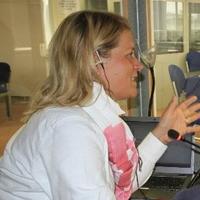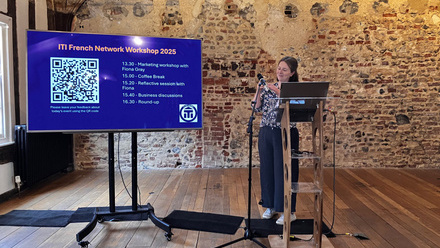Investment and return
Hayley Carter-Smith, Louise Killeen and Kirsty Heimerl-Moggan explain how CPD has helped them with finding work.

Hayley Carter-Smith
Connecting with new people
I made a career change to become a fully freelance translator in September 2019. In my previous (salaried) role, CPD was discussed, but there was no actual requirement to do any. I was somewhat naively surprised to find that CPD proved essential to helping me find paid work.
Sometimes it’s a case of pro bono work helping me secure paid projects. With international development as one of my specialisms, and with the majority of my pre-career-change work experience coming from the charity sector, I do some voluntary translation when I can (much to my husband’s chagrin at the end of the month!). I responded to a post on the Translators for Progress digest in late 2019 looking for volunteers to assist a sustainability- and biodiversity-focused online magazine. These are not my usual areas of specialism, but it was nice to diversify, and as it was pro bono the deadlines were typically much more generous than with paid jobs. However, last year the magazine successfully secured some funding in order to pay professional translators and reviewers for their work. As I was already volunteering there, I was asked if I would be happy to receive payment for my translations…Guess what my answer was! I already enjoyed my voluntary work, which had been contributing to my CPD, but a little extra income was distinctly welcome.
There are also the occasions that arise when CPD brings you into contact with new people. In November 2019 I went to the Translating Europe Forum in Brussels. Aside from travel and accommodation, the event itself was free to attend and, alongside a number of motivating and insightful talks from the European Commission’s translators and interpreters, and from the wider profession, there were several networking opportunities (including two cracking buffet lunches).
I happened to get talking to another delegate I spotted. Like me, she was sipping her coffee alone, so I went over and initiated a chat. Afterwards, we exchanged business cards and went our separate ways ahead of the next session. A couple of months later, I was surprised to receive an email from her out of the blue, asking whether I had any availability to cover her role as in-house translator at a bilingual business and economics media group while she went on leave for a couple of weeks. I completed a short assessment for her superiors to look over, and, more than two years later, I’m still the client’s freelancer of choice. I have even carried out personal translation projects for some of the group’s journalists. That one encounter has seen my network grow and grow!

Louise Killeen
Well worth the time and money
As an employer, a professional language practitioner and more recently the corporate representative on ITI’s Professional Development Committee, I frequently find myself reflecting on the concept of CPD and its impact. I always come back to the genuine value of time and money spent on CPD – it’s an investment in ourselves and a powerful tool that can set us apart in a crowded marketplace. I know freelance practitioners may feel they can’t afford to take time away from paid work for CPD, particularly in the current climate, but aren’t we worth the investment, especially if our efforts result in finding more work?
In terms of setting yourself apart from the competition, CPD can be an invaluable tool for newcomers to the profession. If you don’t have experience, then a clear commitment to investing in yourself evidenced in a CPD log submitted along with your CV can have a powerful impact with a prospective customer. That said, CPD isn’t something that should stop as your career progresses – the clue is in the name – and more seasoned professionals can reap its benefits too. I’ve had at least two of our freelance partners ‘apologise’ for lack of capacity recently due to CPD commitments. Something to apologise for – never; something that will stay in my mind when selecting from a pool of highly skilled professionals – most certainly!
Although there is no mandatory requirement to undertake CPD, many language service providers are certified to ISO 17100 (Translation services – Requirements for translation services), which states that they ‘shall have a process in place to record that… competences…are maintained by continuing practice and regularly updated by training or other means’ and that they ‘keep a record of how competences are maintained and updated’. This requires them to provide tangible evidence of CPD in the form of logs that are checked during annual certification audits. It follows, therefore, that those freelance partners who are completing and logging their CPD on a regular basis could well be higher up the pecking order than those who do not take such a proactive approach. ITI also actively encourages its members to complete and log CPD activities and has recently introduced a badge system to supplement the ‘CPD Achieved’ banner members are entitled to display on completing 30 hours of CPD in a membership year.
We all want to see human language professionals given more credit in the supply chain. CPD demonstrates our commitment to our craft and should help to make us more visible as we strive to obtain much-needed recognition for the value and impact of the work we do.

Kirsty Heimerl-Moggan
Walking and talking
How does my CPD get me work? Because it gives me confidence. When prospective clients contact me about a job, they have often found my details in a directory or on a professional body website or similar. My entries there are the first foot in the door, but the restricted entry size and content available in a directory means it’s not always easy to make the full impression one would like. It’s also quite clear that potential clients who are searching for an interpreter often email or contact several prospective interpreters at the same time for their one job, so they are going to be comparing us against each other.
So the next step to win over the prospective client making an initial enquiry is to ensure that I can ‘walk the walk and talk the talk’ so I am chosen over the competition. And the way I do this is through my CPD. For example, I do a lot of health and safety work, both during multilingual training courses and after industrial accidents have happened, for organisations such as the Health and Safety Executive here in the UK. My CPD for this field of interpreting involves attending courses, keeping up to date with new machine guarding standards and similar. When a potential client approaches me, I can then reply to their email as the expert I have by then become.
I have found that clients appreciate my understanding of their settings, of the concepts that they are trying to convey, and this is what generally convinces them that they are in safe hands if they use my services – at least for the language side of the event. CPD also gets me ‘repeat work’. Another example: as interpreters we often work on big projects which include simultaneous interpreting covering training sessions in new IT systems for staff who have no common language. I obviously do good solid preparation for each, but effective CPD has also given me a grounding in IT which ensures that clients are more likely to choose me for repeat assignments.
Probably the nicest comment I have had from a client, who came back to rebook my interpreting services was: ‘We would like to book you again, because we felt you really knew what we are all about.’
Never miss another Bulletin article

If you would like to read more features and articles on a wide variety of subjects relating to all aspects of the translation and interpreting industry, subscribe to ITI Bulletin. Alternatively, join ITI and get a free subscription included in your membership.






